Unit 8 Culture Shapes Us Lesson 44 Popular Sayings 课件(共36张PPT)
文档属性
| 名称 | Unit 8 Culture Shapes Us Lesson 44 Popular Sayings 课件(共36张PPT) | 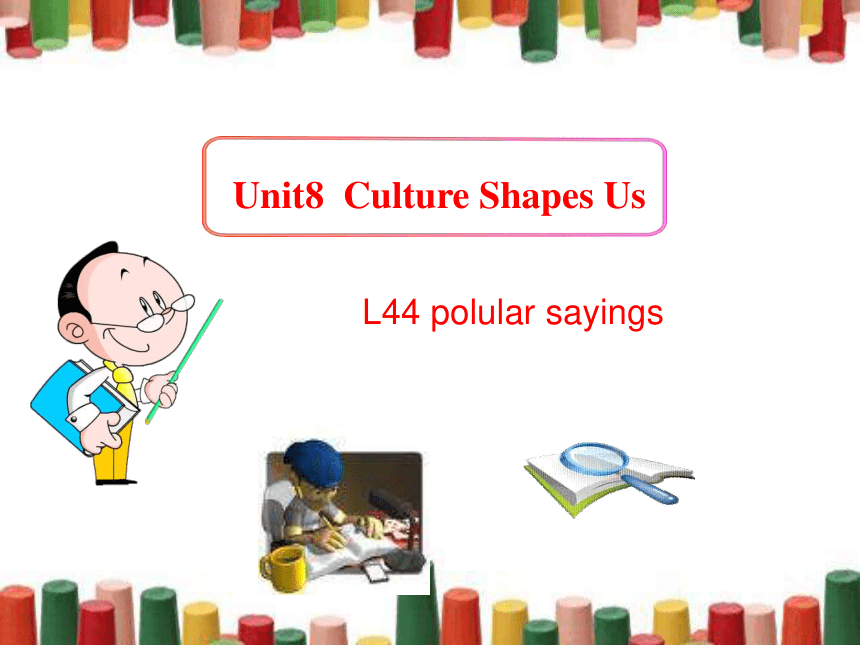 | |
| 格式 | zip | ||
| 文件大小 | 3.0MB | ||
| 资源类型 | 教案 | ||
| 版本资源 | 冀教版 | ||
| 科目 | 英语 | ||
| 更新时间 | 2020-05-25 18:23:55 | ||
图片预览

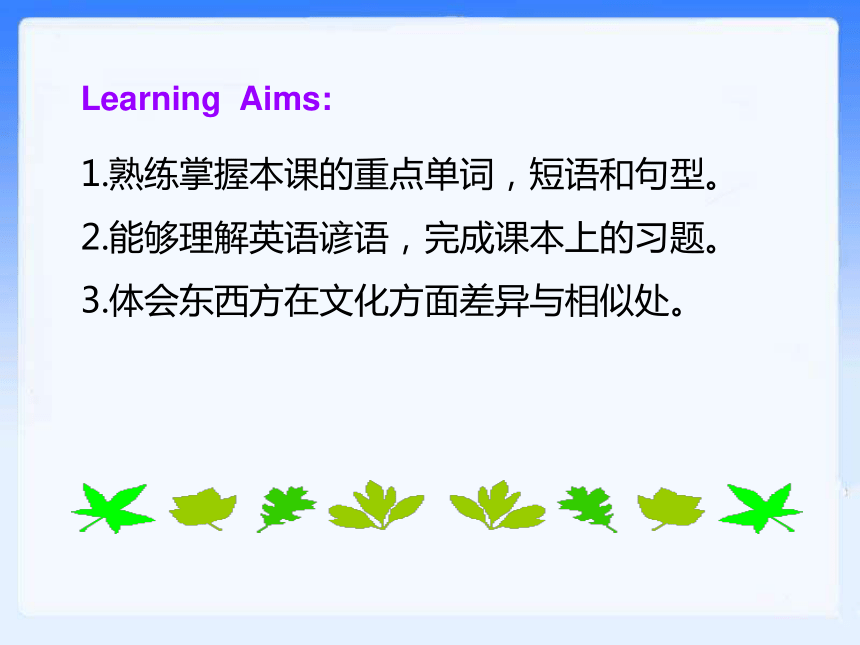
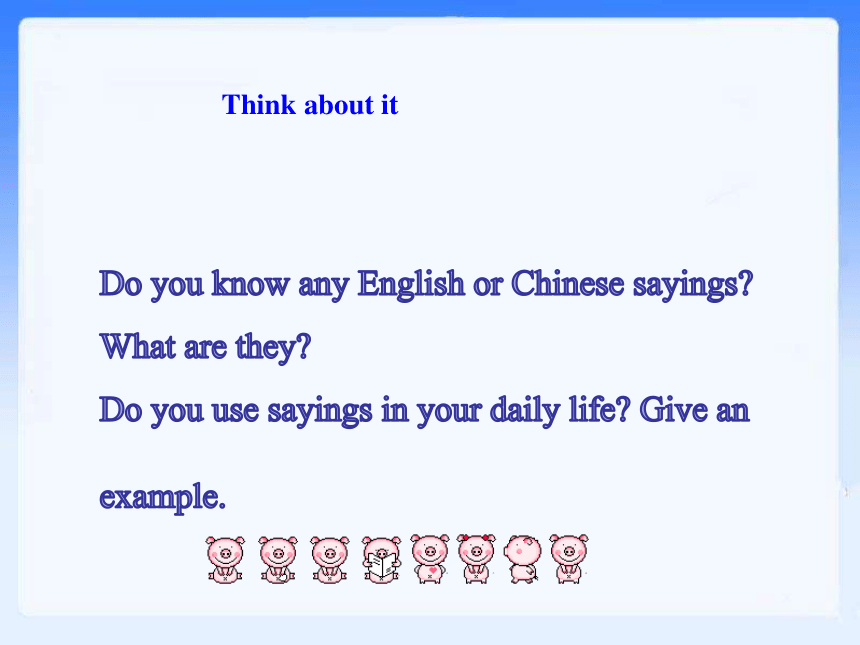
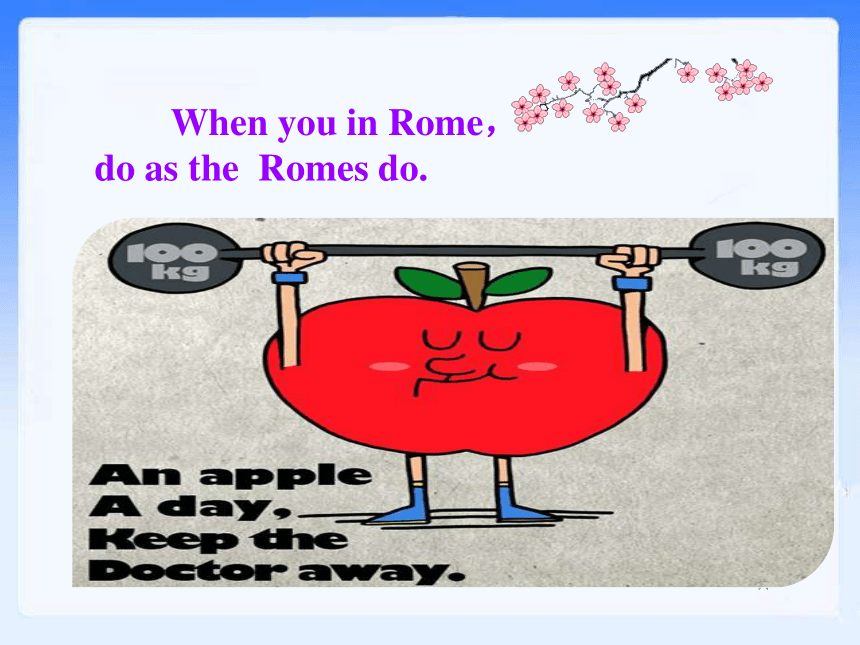

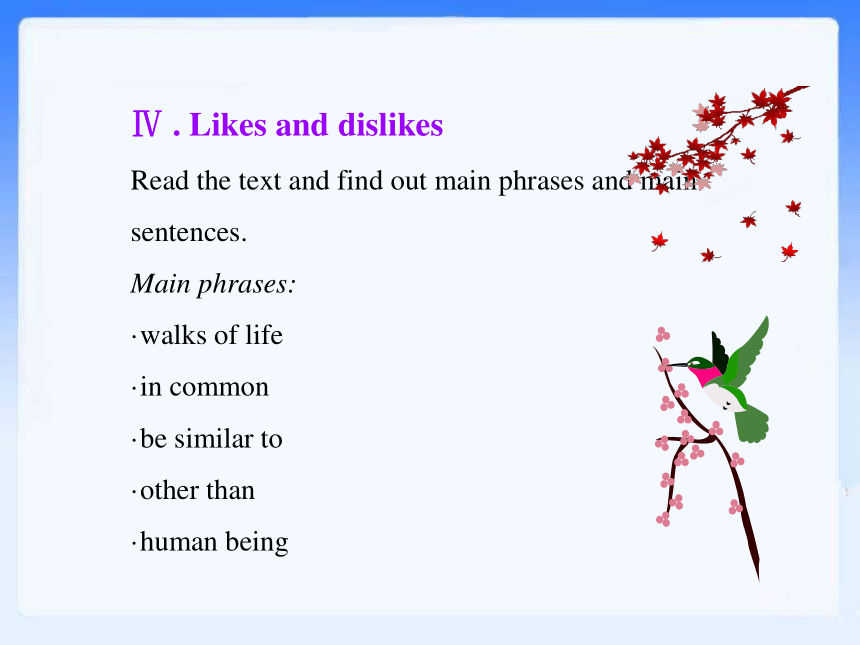
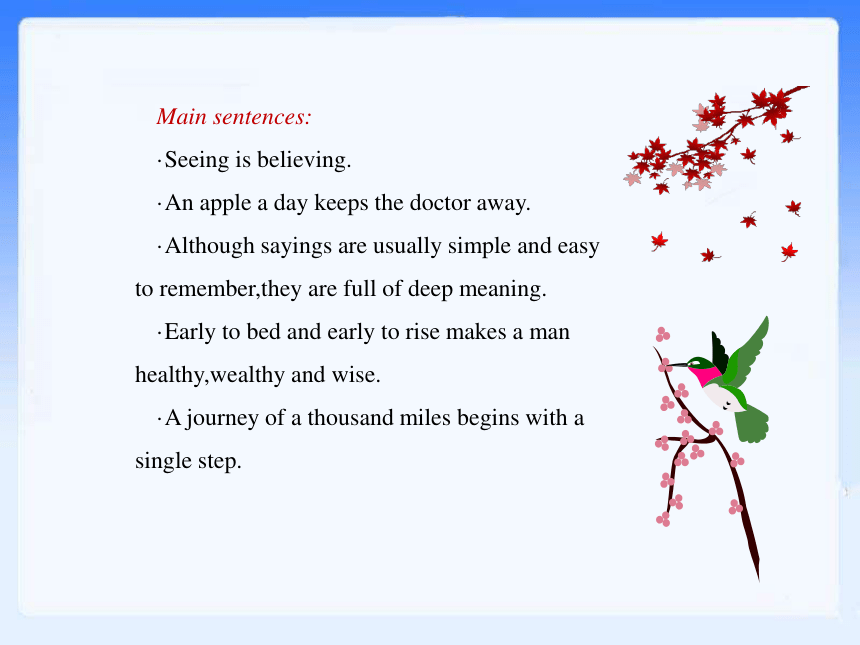

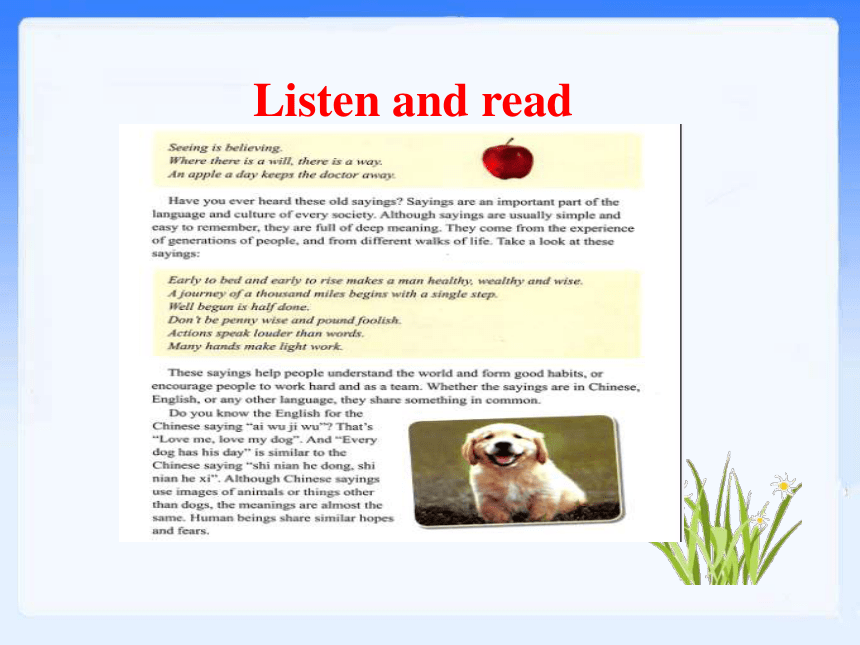
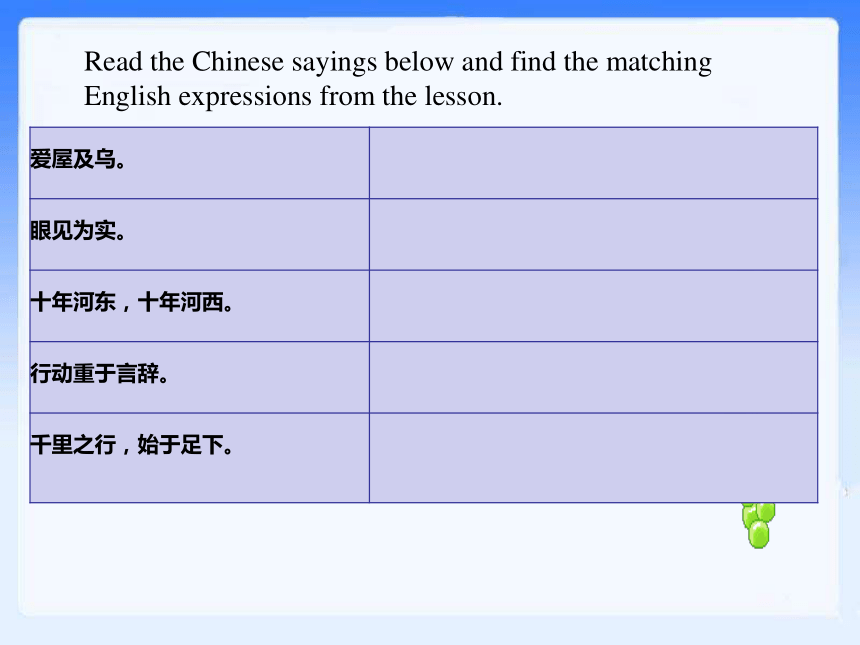
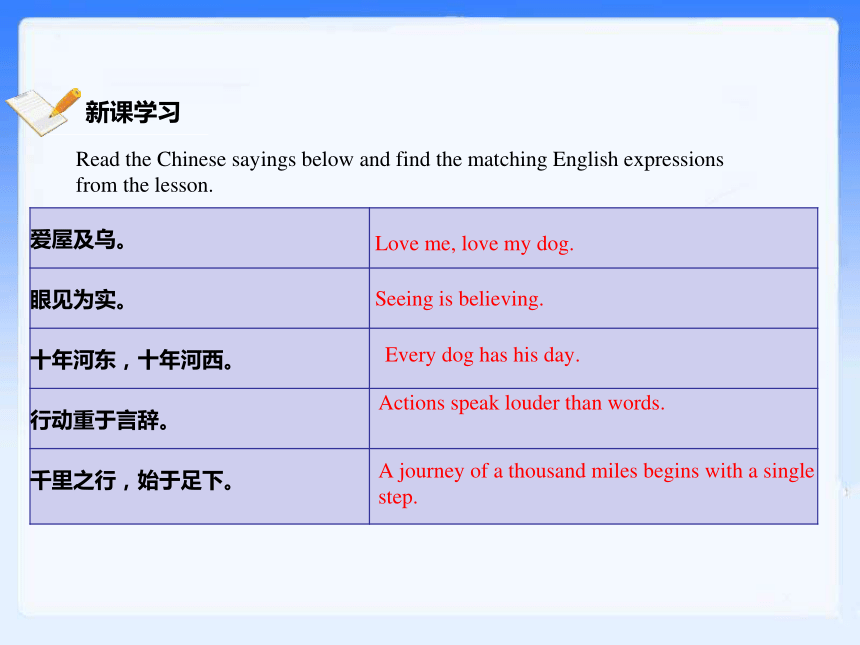
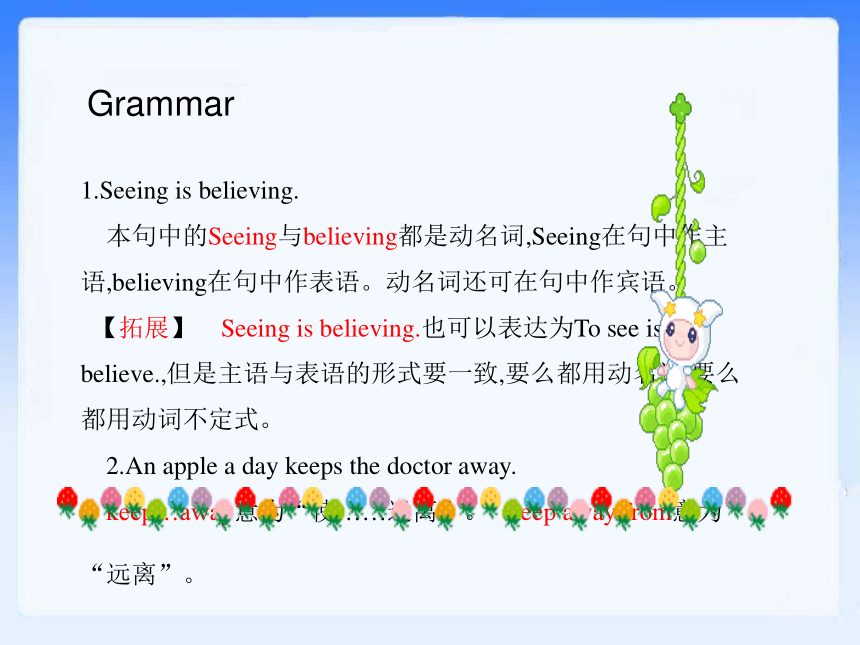
文档简介
(共36张PPT)
Unit8 Culture Shapes Us
L44 polular sayings
Learning Aims:
1.熟练掌握本课的重点单词,短语和句型。
2.能够理解英语谚语,完成课本上的习题。
3.体会东西方在文化方面差异与相似处。
Think about it
When you in Rome,
do as the Romes do.
Can you read and translate?
1. society n. 社会
2. generation n. 一代(人)
3. wealthy adj. 富有的;富裕的
4. penny n. 便士
5. pound n. 镑
6. foolish adj. 愚蠢的;傻的
7. whether conj. 是否;无论
8. human n./adj. 人类(的)
Ⅳ . Likes and dislikes
Read the text and find out main phrases and main sentences.
Main phrases:
·walks of life
·in common
·be similar to
·other than
·human being
Main sentences:
·Seeing is believing.
·An apple a day keeps the doctor away.
·Although sayings are usually simple and easy to remember,they are full of deep meaning.
·Early to bed and early to rise makes a man healthy,wealthy and wise.
·A journey of a thousand miles begins with a single step.
Well begun is half done.
Don’t be penny wise and pound foolish.
Actions speak louder than words.
These sayings help people understand the world and form good habits,or encourage people to work hard and as a team.
Whether the sayings are in Chinese,
English,or any other language,they share something in common.
Listen and read
Read the Chinese sayings below and find the matching English expressions from the lesson.
爱屋及乌。
眼见为实。
十年河东,十年河西。
行动重于言辞。
千里之行,始于足下。
Read the Chinese sayings below and find the matching English expressions from the lesson.
Love me, love my dog.
Seeing is believing.
Every dog has his day.
Actions speak louder than words.
A journey of a thousand miles begins with a single step.
爱屋及乌。
眼见为实。
十年河东,十年河西。
行动重于言辞。
千里之行,始于足下。
1.Seeing is believing.
本句中的Seeing与believing都是动名词,Seeing在句中作主语,believing在句中作表语。动名词还可在句中作宾语。
【拓展】 Seeing is believing.也可以表达为To see is to believe.,但是主语与表语的形式要一致,要么都用动名词,要么都用动词不定式。
2.An apple a day keeps the doctor away.
keep…away意为“使……远离”。 keep away from意为“远离”。
Grammar
3.Although sayings are usually simple and easy to remember,they are full of deep meaning.
短语be full of与be filled with同义,意为“充满,装满”。
4.They come from the experience of generations of people,and from different walks of life.
walk在本句中意为“活动领域,地位;职业”,people from/in different/all walks of life的意思是“各界人士”。
5.Early to bed and early to rise makes a man healthy,wealthy and wise.
本句的主语是由and连接的两个动词不定式短语,被视为一个概念,所以谓语动词用单数形式,如果表示两个概念,谓语动词要用复数形式。
6.A journey of a thousand miles begins with a single step.
begin with意为“以……开始;以
……为起点”,其反义短语为end in,意为“结束于……,以……告终”。
7.Well begun is half done.
本句是省略句,补全后是:That it is well begun is that it is half done.。
8.Don’t be penny wise and pound foolish.
◆penny wise还可以写成penny-wise,意为“小事上精明的;小数目上节约的”;同样,pound foolish也可以写成pound-foolish,意为“大事上糊涂的;大数目上马虎的”,它们都属于合成形容词。
◆pound为名词,意为“磅”,作重量单位;pound还是英国的货币单位,意为“英镑”。1英镑=100便士(pence)。
◆foolish为形容词,意为“愚蠢的;傻的”。由名词fool(傻瓜,笨蛋)加后缀-ish而成。
9.Actions speak louder than words.
◆action在此处为可数名词,意为“所做之事,行动”。 【拓展】action(n.行动,活动) ↑actor(n.男演员)←act(v.行动,扮演)→actress(n.女演员)↓active(adj.活泼的,积极的)→activity(n.活动,行动)
◆loud为副词,意为“高声地,大声地”;loud还可用作形容词,意为“高声的,大声的”,此处用loud的比较级louder。
【辨析】 loud,aloud,loudly
loud,aloud与loudly用作副词时区别如下:
(1)loud响亮地,高声地,侧重发出的音量大,传得远,常与动词speak,talk,say,laugh等连用。
(2)aloud出声地,大声地,强调发出的声音能被听见,常与动词read,call等连用。
(3)loudly高声地,有时可与loud通用,但含有“喧闹”或“嘈杂”的意味。
10.These sayings help people understand the world and form good habits,or encourage people to work hard and as a team.
◆encourage sb.to do sth.意为“鼓励某人做某事”。
◆as 前省略了work。
11.Whether the sayings are in Chinese,
English,or any other language,they share something in common.
◆本句中由whether…or…引导的分句作状语,意为“无论……,还是……”。
【辨析】 whether,if
(1)whether意为“是否”,可用来引导宾语从句,可与or not连用;当从句置于句首或引导主语从句、表语从句时,只能用whether。
(2)if意为“是否”,用来引导宾语从句,不直接与or not连用。if意为“如果”,用来引导条件状语从句。
◆in common意为“共同(做)的;共用的;公有的”。
12.And“Every dog has his day”is similar
to the Chinese saying“shi nian he dong,shi nian he xi”.
be similar to意为“与……相似”。
13.Human beings share similar hopes and fears.
human为名词时,意为“人,人类”,也可表示为human being;作形容词,意为“人性的,人类的”。
一、用所给词的适当形式填空。
1.My brother___________ (not like) watching TV.
2.They ______(come) from America. They___________
(not speak) French.
3.She often ________(wash) clothes herself.
4._______ he ______(have) a dictionary?
5.May 1 is the ______(one) day of May.
doesn’t like
come
don’t speak
washes
Does
have
first
Grammar in use
二、句型转换。
1.We do morning exercises every morning.(改为否定句)
We morning exercises every morning.
2. He always comes to school late.(改为一般疑问句)
he always to school late.
3.He has a book under his arm.(改为否定句) He a book under his arm. 4.He never goes to work by bike.(改为肯定句) He to work by bike. 5.She can speak English very well. (改为否定句) She English very well.
don’t do
Does
come
doesn’t have
can’t speak
always goes
Fill in the blanks using the sayings from the lesson.
(1)Seeing is believing.We warmly welcome you to visit our factory.
(2) .It is very important to make a good start.
(3)Cleaning the room will not take long if we all help.You know, .
(4) . We should do more and speak less.
(5)Although you failed the exam,you shouldn’t give up.
Remember .
Well begun is half done
many hands make light work
Actions speak louder than words
where there is a will,there is a way
Work in pairs.Discuss the meanings of the following sayings.Can you find the matching Chinese sayings?Then make sentences with the sayings you have learned.
·When in Rome,do as the Romans do.
·First come,first served.
·It is never too late to mend.
·No pain,no gain.
入乡随俗。
先到先得。
亡羊补牢,为时未晚。
没有付出就没有收获。
Choose the correct answers.
1. apple a day keeps the doctor away.
A.A B.An C.The D./
2.They are filled meanings.
A.of B.in C.from D.with
3.Parents often encourage us hard.
A.to work B.working C.works D.worked
4.Could you tell me Jim lives here?
A.unless B.whether C.weather D.of
B
D
A
B
三、单项选择。 1.Don’t open the door until the car ______. A. stop B. stops C. stopped D. will stop 2.There are _____ months in a year. December is the ______ months of the year. A. twelve; twelve B. twelve; twelfth
C. twelfth; twelve D. twelve; twelveth 3.We all think that the ____ century will bring us more hopes. A. twenty-first B. twentieth-first
C. twenty-one D. twentieth-one
5.—Your sweater looks nice. Is it ________ wool?
—Yes. And it’s ________ Shanghai.
A. made of; made by B. made of; made in
C. made by; made for D. made by; made from
6. He doesn’t like_____ people.
A. loudly B. louder
C. loud D. aloud
10. Miss Black was married _____ a rich man.
A. with B. to C. in D. of
1. He likes swimming ______ exercise.
2. Lily lives _____ her mother in a big house.
3. I often wear a pair _____ blue jeans.
4. We will have a trip to Canada _____ October.
5. Who bought the nice hat _____ you?
四. 用适当的介词填空
for
with
of
in
for
1. They drew something likes birds.
A B C D
2. He went to England study English last term.
A B C D
3. Her feet are bigger than her mother.
A B C D
4. Do you like playing piano?
A B C D
5. The girl on a blue sweater is my sister.
A B C D
五. 改错。
like
D
to study
C
her mother’s.
D
the piano?
D
in
B
1. She often _____ (cook) at home.
2. Who ______ (want) to go swimming with us after school?
3. This pair of shoes _____ (be) new.
4. We _________ (not do) our homework in the afternoon, because we’re sleepy.
5. _____ Li Ming _____ (read) English every morning?
六. 用所给单词的正确形式填空。
cooks
wants
is
don’t do
Does
read
1. He does morning exercises every morning. (改为否定句)
He _________ _______ morning exercises every morning.
2. I am a good child in my parents’ eyes. (改为一般疑问句)
_____ _____ a good child in your parents’ eyes?
3. Does Jenny go to school on time? (作否定回答)
______ , ______ _________.
4. Danny can speak Chinese very well. (改为否定句)
Danny _________ _________ Chinese very well.
七. 按要求改写句子,每空一词。
Are
you
doesn’t
do
No
she
doesn’t
can’t
speak
一、选择与划线部分意思相同或相近的选项。
1.The students go to school at 7:00.
A. child B. pupils C. boys D. girl
2.They are wearing uniforms at work.
A. in B. on C. put on D. taking off
3.People hate clothes made of fiber(化纤).
A. love B. dislikes C. like to wear D. don’t like
Extra Exercises
二、单项选择。
1. You’d better not read today’s newspaper because there is ____ in it.
A. something interesting B. anything new
C. important thing D. nothing special
2. Do you enjoy ____ in China?
A. living B. to live C. live D. lives
3.It’s getting dark,____ they’re still working.
A. and B. but C. so D. or
4.—Your sweater looks nice. Is it ____ wool?
--Yes, and it’s ____ Inner Mongolia.
A. made of; made by B. made of; made in
C. made by; made of D. made by; made from
三、用所给词的适当形式填空。
1.We are always ready _________ (help) others.
2.He was happy _______ (see) your e-mail.
3.She invited me _______ (come) to her birthday party.
4. If the phone _______ (ring), can you answer it?
5.He said nothing and went out ___________ (immediate).
6.Is the man ________ (marry)?
7. Your _____________ (pronounce) is quite good.
to help
to see
to come
rings
immediately
married
pronunciation
Homework
Collect some English sayings.
He is a good friend that speaks well of us behind our backs.
背后说好话,才是真朋友。
Thank you!
Unit8 Culture Shapes Us
L44 polular sayings
Learning Aims:
1.熟练掌握本课的重点单词,短语和句型。
2.能够理解英语谚语,完成课本上的习题。
3.体会东西方在文化方面差异与相似处。
Think about it
When you in Rome,
do as the Romes do.
Can you read and translate?
1. society n. 社会
2. generation n. 一代(人)
3. wealthy adj. 富有的;富裕的
4. penny n. 便士
5. pound n. 镑
6. foolish adj. 愚蠢的;傻的
7. whether conj. 是否;无论
8. human n./adj. 人类(的)
Ⅳ . Likes and dislikes
Read the text and find out main phrases and main sentences.
Main phrases:
·walks of life
·in common
·be similar to
·other than
·human being
Main sentences:
·Seeing is believing.
·An apple a day keeps the doctor away.
·Although sayings are usually simple and easy to remember,they are full of deep meaning.
·Early to bed and early to rise makes a man healthy,wealthy and wise.
·A journey of a thousand miles begins with a single step.
Well begun is half done.
Don’t be penny wise and pound foolish.
Actions speak louder than words.
These sayings help people understand the world and form good habits,or encourage people to work hard and as a team.
Whether the sayings are in Chinese,
English,or any other language,they share something in common.
Listen and read
Read the Chinese sayings below and find the matching English expressions from the lesson.
爱屋及乌。
眼见为实。
十年河东,十年河西。
行动重于言辞。
千里之行,始于足下。
Read the Chinese sayings below and find the matching English expressions from the lesson.
Love me, love my dog.
Seeing is believing.
Every dog has his day.
Actions speak louder than words.
A journey of a thousand miles begins with a single step.
爱屋及乌。
眼见为实。
十年河东,十年河西。
行动重于言辞。
千里之行,始于足下。
1.Seeing is believing.
本句中的Seeing与believing都是动名词,Seeing在句中作主语,believing在句中作表语。动名词还可在句中作宾语。
【拓展】 Seeing is believing.也可以表达为To see is to believe.,但是主语与表语的形式要一致,要么都用动名词,要么都用动词不定式。
2.An apple a day keeps the doctor away.
keep…away意为“使……远离”。 keep away from意为“远离”。
Grammar
3.Although sayings are usually simple and easy to remember,they are full of deep meaning.
短语be full of与be filled with同义,意为“充满,装满”。
4.They come from the experience of generations of people,and from different walks of life.
walk在本句中意为“活动领域,地位;职业”,people from/in different/all walks of life的意思是“各界人士”。
5.Early to bed and early to rise makes a man healthy,wealthy and wise.
本句的主语是由and连接的两个动词不定式短语,被视为一个概念,所以谓语动词用单数形式,如果表示两个概念,谓语动词要用复数形式。
6.A journey of a thousand miles begins with a single step.
begin with意为“以……开始;以
……为起点”,其反义短语为end in,意为“结束于……,以……告终”。
7.Well begun is half done.
本句是省略句,补全后是:That it is well begun is that it is half done.。
8.Don’t be penny wise and pound foolish.
◆penny wise还可以写成penny-wise,意为“小事上精明的;小数目上节约的”;同样,pound foolish也可以写成pound-foolish,意为“大事上糊涂的;大数目上马虎的”,它们都属于合成形容词。
◆pound为名词,意为“磅”,作重量单位;pound还是英国的货币单位,意为“英镑”。1英镑=100便士(pence)。
◆foolish为形容词,意为“愚蠢的;傻的”。由名词fool(傻瓜,笨蛋)加后缀-ish而成。
9.Actions speak louder than words.
◆action在此处为可数名词,意为“所做之事,行动”。 【拓展】action(n.行动,活动) ↑actor(n.男演员)←act(v.行动,扮演)→actress(n.女演员)↓active(adj.活泼的,积极的)→activity(n.活动,行动)
◆loud为副词,意为“高声地,大声地”;loud还可用作形容词,意为“高声的,大声的”,此处用loud的比较级louder。
【辨析】 loud,aloud,loudly
loud,aloud与loudly用作副词时区别如下:
(1)loud响亮地,高声地,侧重发出的音量大,传得远,常与动词speak,talk,say,laugh等连用。
(2)aloud出声地,大声地,强调发出的声音能被听见,常与动词read,call等连用。
(3)loudly高声地,有时可与loud通用,但含有“喧闹”或“嘈杂”的意味。
10.These sayings help people understand the world and form good habits,or encourage people to work hard and as a team.
◆encourage sb.to do sth.意为“鼓励某人做某事”。
◆as 前省略了work。
11.Whether the sayings are in Chinese,
English,or any other language,they share something in common.
◆本句中由whether…or…引导的分句作状语,意为“无论……,还是……”。
【辨析】 whether,if
(1)whether意为“是否”,可用来引导宾语从句,可与or not连用;当从句置于句首或引导主语从句、表语从句时,只能用whether。
(2)if意为“是否”,用来引导宾语从句,不直接与or not连用。if意为“如果”,用来引导条件状语从句。
◆in common意为“共同(做)的;共用的;公有的”。
12.And“Every dog has his day”is similar
to the Chinese saying“shi nian he dong,shi nian he xi”.
be similar to意为“与……相似”。
13.Human beings share similar hopes and fears.
human为名词时,意为“人,人类”,也可表示为human being;作形容词,意为“人性的,人类的”。
一、用所给词的适当形式填空。
1.My brother___________ (not like) watching TV.
2.They ______(come) from America. They___________
(not speak) French.
3.She often ________(wash) clothes herself.
4._______ he ______(have) a dictionary?
5.May 1 is the ______(one) day of May.
doesn’t like
come
don’t speak
washes
Does
have
first
Grammar in use
二、句型转换。
1.We do morning exercises every morning.(改为否定句)
We morning exercises every morning.
2. He always comes to school late.(改为一般疑问句)
he always to school late.
3.He has a book under his arm.(改为否定句) He a book under his arm. 4.He never goes to work by bike.(改为肯定句) He to work by bike. 5.She can speak English very well. (改为否定句) She English very well.
don’t do
Does
come
doesn’t have
can’t speak
always goes
Fill in the blanks using the sayings from the lesson.
(1)Seeing is believing.We warmly welcome you to visit our factory.
(2) .It is very important to make a good start.
(3)Cleaning the room will not take long if we all help.You know, .
(4) . We should do more and speak less.
(5)Although you failed the exam,you shouldn’t give up.
Remember .
Well begun is half done
many hands make light work
Actions speak louder than words
where there is a will,there is a way
Work in pairs.Discuss the meanings of the following sayings.Can you find the matching Chinese sayings?Then make sentences with the sayings you have learned.
·When in Rome,do as the Romans do.
·First come,first served.
·It is never too late to mend.
·No pain,no gain.
入乡随俗。
先到先得。
亡羊补牢,为时未晚。
没有付出就没有收获。
Choose the correct answers.
1. apple a day keeps the doctor away.
A.A B.An C.The D./
2.They are filled meanings.
A.of B.in C.from D.with
3.Parents often encourage us hard.
A.to work B.working C.works D.worked
4.Could you tell me Jim lives here?
A.unless B.whether C.weather D.of
B
D
A
B
三、单项选择。 1.Don’t open the door until the car ______. A. stop B. stops C. stopped D. will stop 2.There are _____ months in a year. December is the ______ months of the year. A. twelve; twelve B. twelve; twelfth
C. twelfth; twelve D. twelve; twelveth 3.We all think that the ____ century will bring us more hopes. A. twenty-first B. twentieth-first
C. twenty-one D. twentieth-one
5.—Your sweater looks nice. Is it ________ wool?
—Yes. And it’s ________ Shanghai.
A. made of; made by B. made of; made in
C. made by; made for D. made by; made from
6. He doesn’t like_____ people.
A. loudly B. louder
C. loud D. aloud
10. Miss Black was married _____ a rich man.
A. with B. to C. in D. of
1. He likes swimming ______ exercise.
2. Lily lives _____ her mother in a big house.
3. I often wear a pair _____ blue jeans.
4. We will have a trip to Canada _____ October.
5. Who bought the nice hat _____ you?
四. 用适当的介词填空
for
with
of
in
for
1. They drew something likes birds.
A B C D
2. He went to England study English last term.
A B C D
3. Her feet are bigger than her mother.
A B C D
4. Do you like playing piano?
A B C D
5. The girl on a blue sweater is my sister.
A B C D
五. 改错。
like
D
to study
C
her mother’s.
D
the piano?
D
in
B
1. She often _____ (cook) at home.
2. Who ______ (want) to go swimming with us after school?
3. This pair of shoes _____ (be) new.
4. We _________ (not do) our homework in the afternoon, because we’re sleepy.
5. _____ Li Ming _____ (read) English every morning?
六. 用所给单词的正确形式填空。
cooks
wants
is
don’t do
Does
read
1. He does morning exercises every morning. (改为否定句)
He _________ _______ morning exercises every morning.
2. I am a good child in my parents’ eyes. (改为一般疑问句)
_____ _____ a good child in your parents’ eyes?
3. Does Jenny go to school on time? (作否定回答)
______ , ______ _________.
4. Danny can speak Chinese very well. (改为否定句)
Danny _________ _________ Chinese very well.
七. 按要求改写句子,每空一词。
Are
you
doesn’t
do
No
she
doesn’t
can’t
speak
一、选择与划线部分意思相同或相近的选项。
1.The students go to school at 7:00.
A. child B. pupils C. boys D. girl
2.They are wearing uniforms at work.
A. in B. on C. put on D. taking off
3.People hate clothes made of fiber(化纤).
A. love B. dislikes C. like to wear D. don’t like
Extra Exercises
二、单项选择。
1. You’d better not read today’s newspaper because there is ____ in it.
A. something interesting B. anything new
C. important thing D. nothing special
2. Do you enjoy ____ in China?
A. living B. to live C. live D. lives
3.It’s getting dark,____ they’re still working.
A. and B. but C. so D. or
4.—Your sweater looks nice. Is it ____ wool?
--Yes, and it’s ____ Inner Mongolia.
A. made of; made by B. made of; made in
C. made by; made of D. made by; made from
三、用所给词的适当形式填空。
1.We are always ready _________ (help) others.
2.He was happy _______ (see) your e-mail.
3.She invited me _______ (come) to her birthday party.
4. If the phone _______ (ring), can you answer it?
5.He said nothing and went out ___________ (immediate).
6.Is the man ________ (marry)?
7. Your _____________ (pronounce) is quite good.
to help
to see
to come
rings
immediately
married
pronunciation
Homework
Collect some English sayings.
He is a good friend that speaks well of us behind our backs.
背后说好话,才是真朋友。
Thank you!
同课章节目录
- Unit 7 Work for Peace
- Lesson 37 Don't Fight!
- Lesson 38 Making School a Better Place
- Lesson 39 The Dove and the Olive Branch
- Lesson 40 The UN—Power of Words
- Lesson 41 Jenny's Good Advice
- Lesson 42 Peace at Last
- Unit Review
- Unit 8 Culture Shapes Us
- Lesson 43 A Visit to Chinatown
- Lesson 44 Popular Sayings
- Lesson 45 Different Manners
- Lesson 46 Home to Many Cultures
- Lesson 47 Good Manners
- Lesson 48 Supper with the Bradshaws
- Unit Review
- Unit 9 Communication
- Lesson 49 Get Along with Others
- Lesson 50 Tips for Good Communication
- Lesson 51 What Could Be Wrong?
- Lesson 52 The Power of a Smile
- Lesson 53 Working in Groups
- Lesson 54 How Embarrassing!
- Unit Review
- Unit 10 Get Ready for the Future
- Lesson 55 Look into the Future
- Lesson 56 Manage Your Time
- Lesson 57 Best Wishes
- Lesson 58 Ms.Liu's Speech
- Lesson 59 Keep Your Choices Open
- Lesson 60 Get a Good Education
- Unit Review
